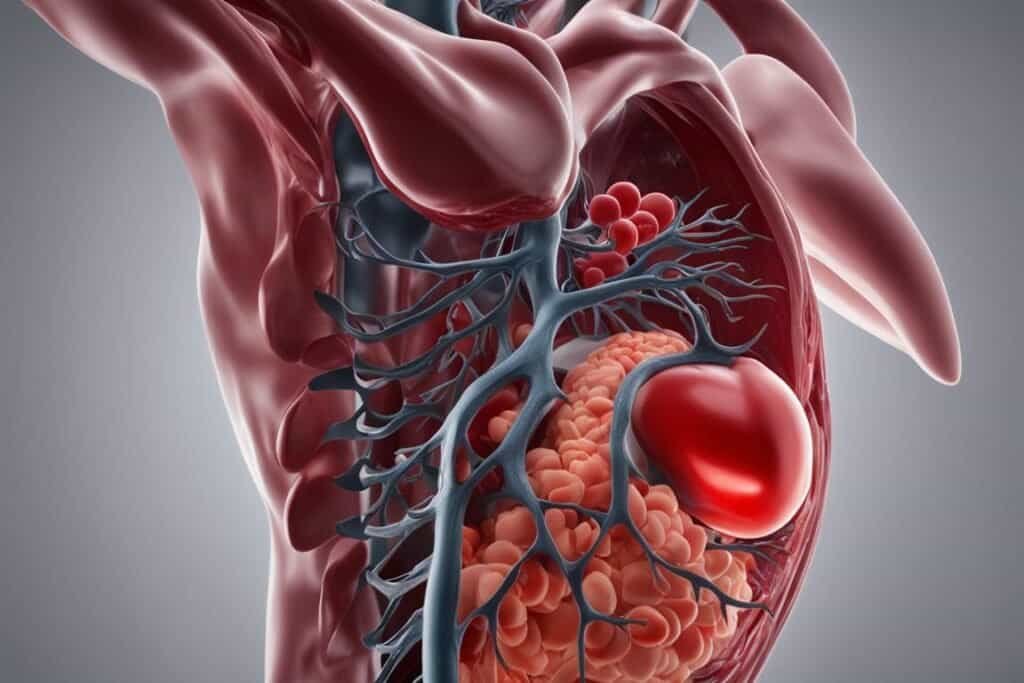If you or a loved one has been diagnosed with familial hypercholesterolemia, you may be wondering about the most effective treatment options for managing this genetic disorder. One commonly prescribed medication that plays a crucial role in cholesterol management is Atorvastatin.
Atorvastatin is a medication that is widely used in the management of familial hypercholesterolemia. This genetic condition is characterized by high levels of cholesterol in the blood, which can significantly increase the risk of cardiovascular disease. Atorvastatin works by reducing LDL cholesterol levels, which are a major risk factor for heart-related complications.
Key Takeaways:
- Atorvastatin is a commonly used medication for managing familial hypercholesterolemia.
- Familial hypercholesterolemia is a genetic disorder that leads to high levels of cholesterol in the blood.
- Lifestyle modifications, such as a healthy diet and regular exercise, are important in combination with medication.
- Atorvastatin effectively lowers LDL cholesterol levels, reducing the risk of cardiovascular events.
- It is important to discuss any concerns or potential side effects with your healthcare provider.
Understanding Familial Hypercholesterolemia
Familial hypercholesterolemia is an inherited condition characterized by high levels of LDL cholesterol in the blood. This condition is caused by mutations in genes that regulate LDL receptor function.
Familial hypercholesterolemia significantly increases the risk of developing cardiovascular disease at an early age.
The primary goal of treatment for familial hypercholesterolemia is to reduce LDL cholesterol levels and minimize the risk of cardiovascular events. Along with lifestyle modifications, such as maintaining a healthy diet and engaging in regular exercise, medications are often recommended for cholesterol management.
Atorvastatin, a commonly prescribed medication, is effective in lowering cholesterol levels and reducing the risk of complications.
To better understand familial hypercholesterolemia, let’s take a closer look at its causes, risk factors, and available treatment options:
Causes of Familial Hypercholesterolemia
Familial hypercholesterolemia is caused by mutations in genes that regulate LDL receptor function. These mutations prevent the liver from effectively removing LDL cholesterol from the bloodstream, resulting in high levels of LDL cholesterol.
Risk Factors for Familial Hypercholesterolemia
The primary risk factor for familial hypercholesterolemia is a family history of the condition. If a close family member, such as a parent or sibling, has familial hypercholesterolemia, there is a higher likelihood of developing the condition.
Other risk factors include obesity, a sedentary lifestyle, and a diet high in saturated fats and cholesterol.
Treatment Options for Familial Hypercholesterolemia
Treatment for familial hypercholesterolemia typically involves a combination of lifestyle modifications and medications. Lifestyle modifications include adopting a healthy diet, engaging in regular physical activity, maintaining a healthy weight, and avoiding tobacco use.
Medications, such as atorvastatin, are widely used to lower cholesterol levels in familial hypercholesterolemia. These medications work by inhibiting the production of cholesterol in the liver, leading to a decrease in LDL cholesterol levels.
Table: Comparison of Medications for Familial Hypercholesterolemia Treatment
| Medication | Mode of Action | Effectiveness | Side Effects |
|---|---|---|---|
| Atorvastatin | Inhibits cholesterol production in the liver | Highly effective in reducing LDL cholesterol levels | Gastrointestinal upset, muscle aches, liver function abnormalities |
| Simvastatin | Inhibits cholesterol production in the liver | Effective in reducing LDL cholesterol levels | Gastrointestinal upset, muscle aches, liver function abnormalities |
| Rosuvastatin | Inhibits cholesterol production in the liver | Highly effective in reducing LDL cholesterol levels | Gastrointestinal upset, muscle aches, liver function abnormalities |
| Ezetimibe | Reduces cholesterol absorption in the intestines | Effective as an add-on therapy to statins | Gastrointestinal upset |
It is essential to work closely with a healthcare provider to develop a personalized treatment plan that takes into account individual factors and preferences.

By understanding familial hypercholesterolemia and actively managing cholesterol levels, individuals can reduce the risk of cardiovascular events and lead healthier lives.
The Role of Atorvastatin in Cholesterol Management
Atorvastatin, a medication belonging to the class of statins, is highly effective in managing cholesterol levels and reducing the risk of cardiovascular events in patients with familial hypercholesterolemia. It works by inhibiting an enzyme involved in cholesterol synthesis, which leads to lower LDL cholesterol levels.
One of the key mechanisms of atorvastatin is its ability to increase the clearance of LDL particles from the bloodstream, preventing their buildup in the arterial walls. It also inhibits the production of LDL cholesterol in the liver, contributing to further reductions in LDL cholesterol levels.
In addition to lowering LDL cholesterol, atorvastatin has been shown to increase HDL cholesterol levels, which is often referred to as the “good” cholesterol. This favorable effect on HDL cholesterol is important for maintaining a healthy lipid profile and reducing the risk of cardiovascular disease.
Atorvastatin also has the potential to reduce triglyceride levels, another type of fat found in the blood. High triglyceride levels are associated with an increased risk of heart disease.
Moreover, atorvastatin has been found to have anti-inflammatory effects on the blood vessels, reducing the risk of inflammation-related complications in individuals with familial hypercholesterolemia.
In summary, atorvastatin plays a critical role in managing cholesterol levels and reducing the risk of cardiovascular events in patients with familial hypercholesterolemia. Its effectiveness in lowering LDL cholesterol levels, increasing HDL cholesterol levels, reducing triglycerides, and combating inflammation makes it an essential part of the treatment plan for individuals with this genetic disorder.
Safety and Adverse Effects of Atorvastatin
When it comes to managing cholesterol levels with Atorvastatin therapy for familial hypercholesterolemia, it is important to be aware of its potential side effects. While Atorvastatin is generally well tolerated, like any medication, it may cause certain adverse effects that deserve attention. The most common side effects reported with Atorvastatin include gastrointestinal upset, muscle aches, and liver function abnormalities.
In rare cases, serious side effects such as muscle breakdown (rhabdomyolysis) and liver toxicity have been observed. These serious side effects are more likely to occur at higher doses or when Atorvastatin is used in combination with certain medications. It is crucial for patients to discuss any concerns or potential side effects with their healthcare provider to ensure the safe and effective use of Atorvastatin in managing cholesterol levels.
In summary, although Atorvastatin is an effective therapy for familial hypercholesterolemia, it is essential to be aware of its potential side effects. By having open and honest conversations with healthcare providers, patients can address any concerns and ensure that the benefits of Atorvastatin outweigh the risks, ultimately leading to effective cholesterol management.

| Common Side Effects | Rare but Serious Side Effects |
|---|---|
|
|
Other Treatment Options for Familial Hypercholesterolemia
In addition to atorvastatin, there are various other treatment options available for familial hypercholesterolemia. These treatment options aim to effectively manage high cholesterol levels and decrease the risk of cardiovascular complications. Along with lifestyle modifications, your healthcare provider may recommend the following:
- Other Statins: Besides atorvastatin, statins like simvastatin and rosuvastatin are commonly prescribed to lower cholesterol levels in patients with familial hypercholesterolemia. These medications work by inhibiting the production of cholesterol in the liver.
- Cholesterol-Lowering Medications: Medications like ezetimibe and PCSK9 inhibitors may be used in combination with statins to further lower LDL cholesterol levels. These medications have different mechanisms of action and can provide additional benefits in cholesterol management.
- Aggressive Treatment Options: In some cases, more aggressive treatment options may be necessary. LDL apheresis is a procedure that filters LDL cholesterol from the blood, while liver transplantation involves replacing a diseased liver with a healthy one. These options are typically reserved for individuals who have severe familial hypercholesterolemia or are at high risk of cardiovascular events.
In determining the most appropriate treatment plan for you, your healthcare provider will consider factors such as the severity of your condition, your individual characteristics, and your treatment preferences. It is important to work closely with your healthcare team to develop a personalized treatment plan that optimally manages your cholesterol levels in familial hypercholesterolemia.
Conclusion
Managing cholesterol levels is crucial in the treatment of familial hypercholesterolemia, and Atorvastatin has proven to be an effective therapy in achieving this goal. By lowering LDL cholesterol levels, Atorvastatin significantly reduces the risk of cardiovascular events in individuals with familial hypercholesterolemia.
However, it is important to note that Atorvastatin is just one part of a comprehensive treatment plan. Lifestyle modifications, such as adopting a healthy diet and engaging in regular exercise, are essential in conjunction with Atorvastatin therapy. Additionally, other cholesterol-lowering medications may be prescribed to further optimize cholesterol management.
While Atorvastatin is generally well-tolerated, it’s important to be aware of potential side effects and to communicate any concerns to your healthcare provider. By closely collaborating with your healthcare team, you can effectively manage your cholesterol levels, minimize the risks associated with familial hypercholesterolemia, and lead a heart-healthy life.

